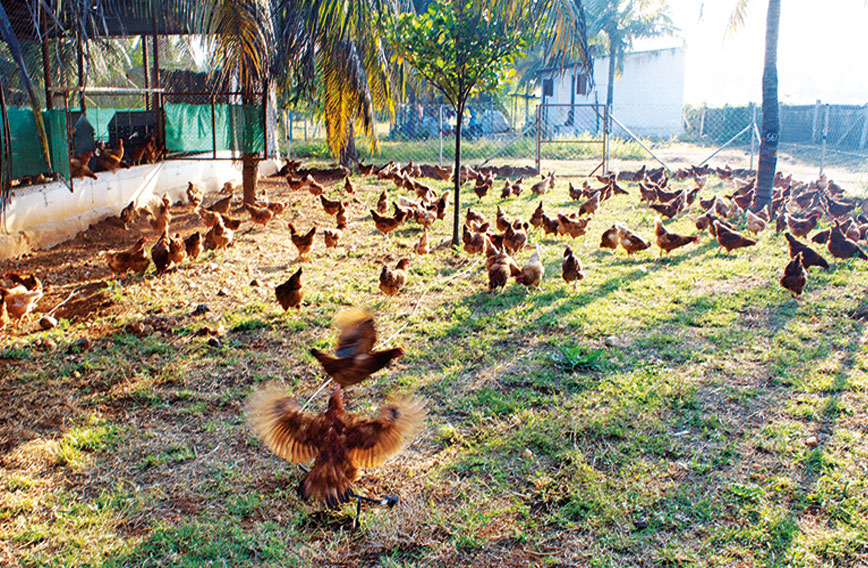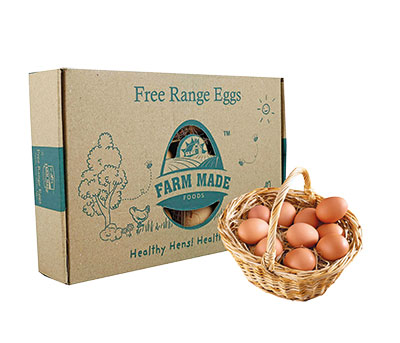
Raam Mohan with one of his chickens
Happy chicken, better egg: Caring farms raise the bar
Surmayi Khatana
A time there was when invariably the only eggs you bought were from the kirana store nearby. These are white, cheap and stacked high — much like the hens that lay them are kept in cramped cages on industrialized farms where no thought is given to the physical and emotional well-being of the birds.
But no longer. There are other options. Smaller chicken farms have been raising the bar for the egg industry in general. They ensure that hens roam free, eat at their pleasure from natural surroundings and deliver eggs as and when they feel up to it.
These farms don’t count much for volumes and yet they give discerning consumers a significant choice. Healthy birds deliver healthier eggs. It is important to know that the eggs you eat are the result of what farms do with the chickens that produce them. Ecologically conscious farms don’t use reinforced feeds. Your eggs come from birds that live stress-free lives and haven’t been pumped up with antibiotics and steroids to keep them going.
It is also no longer necessary to buy eggs from the kirana store next door. Online grocery shopping has changed that. You could be in Gurugram but sourcing your eggs from Tamil Nadu, which is exactly what we did when Farm Made Foods popped up on the Meatigo website.
Farm Made Foods has several free-range egg farms that are full of happy hens and happier eggs. The eggs arrive at your doorstep in cardboard boxes, nestled in tufts of grass.
Farm Made Foods was founded in 2015 by Raam Mohan, 32, who comes from an agricultural family near Coimbatore. He first pitched the idea to Raam Prasad, his brother, who is a partner in Farm Made Foods. After a while he was joined by 44-year-old Kumar Kempaiah.
The farms at Farm Made Foods house only 1,300 hens on an acre of land. The barn where the hens live takes up nearly 4,000 square feet while leaving 41,000 square feet for the hens to roam freely during the day. The farm gets one egg every alternate day from each hen.
 |
| Kumar Kempaiah |
The eggs are tagged and batched with serial numbers of the farm they are coming from. Farm Made Foods has multiple farms on the outskirts of Coimbatore. The hens at Farm Made Foods forage and eat what they want to eat, which is usually protein rich bugs and grass for chlorophyll. “Our hens are seldom unwell, so we give them only probiotics,” says Kempaiah.
The hens wake up at 4.35 am and are out of their barn at the first ray of sunlight. They jump around, forage, look for insects, and eat the feed provided by the caretakers. They take dust baths to rid themselves of dirt and nits. Around 5.30 pm they head back into the barn, where they perch on rods to rest and sleep. Hens cannot take extreme temperatures.
Soft switch-off lights, which take around an hour to go completely dark, are used. “The hens cannot be shocked with the light suddenly changing,” says Kempaiah. Only water is given to the hens post-7 p.m. “Or else, hens will eat unlimited food if it is available!”
Do hens run away on a free farm? “Even if they get to another barn, the hens come back to their own barn,” explains Kempaiah.
The birds are territorial. The barns have nesting or brooding boxes for them to comfortably lay eggs, he tells us. The hens will wait for a specific nesting box they are comfortable with or used to for as long as an hour to lay an egg if it is occupied by another hen. They will not use another nesting box even if it is alongside.
The farms were originally coconut tree farms owned by Mohan’s family. The coconut trees continue to grow and provide the shade that protects the hens from harsh sun. The trees also make it difficult for predators like vultures to attack the hens.
These conditions are idyllic and vastly different from a typical industrialized farm where hens are caged in closed areas. In cages, they cannot sit, move or even turn.
But in these conditions, they produce an egg a day. An acre can house up to 50,000 hens, meaning 50,000 eggs a day. Aeration is bad because of poor ventilation. Hens are also fed anticipatory antibiotics.
They have no activity and eat the feed they are provided and live for some 80 to 100 weeks in these stressful conditions.
“The cortisol hormone from high stress levels gets carried into the egg,” says Kempaiah.
 Chickens roam around freely at a poultry farm
Chickens roam around freely at a poultry farm
“We realized a lot of brands in the market claimed to be free-range, but didn't meet standards. We did not want our consumers to think we were just using those terms,” says Mohan. So they reached out to Humane Farm Animal Care, a non-profit certification organization in the US, and had them fly in to check out their farms. “After they saw that we met their standards we got the Humane Farm Animal Care certification.”
Mohan has an engineering degree. It was while studying management at the University of Glasgow that he was introduced to ‘new age farming’. He decided to give free-range poultry farming a shot.
He started experimenting in 2013, using his family’s poultry farm near Coimbatore which was producing 80 to 100 eggs per day. He tried to understand how the birds behaved in an environment in which they were free and what their daily schedule would look like. With personal savings, coupled with some capital borrowed from his father, Mohan set up Farm Made Foods.
Kempaiah was a mechanical engineer before he decided to quit his job and raise a vegetable and mushroom farm. He met Mohan in 2016 and realized their ideas aligned. He decided to shelve the vegetable and mushroom farm project and work with Farm Made Foods on free-range eggs instead.
The coconut plantations produce another range of products that Farm Made Foods offers — coconut sugar, coconut candy and coconut laddoos.
The team has around 200 people in total. The poultry farm employs mostly women. The farm workers are provided accommodation along with their families. Men are usually ‘tappers’ for the coconut trees and work on feed mills for the hens. “In agriculture even if one staff member feels demotivated, many things in the process could go wrong,” says Kempaiah.
During the initial months of the pandemic, logistics were a challenge. Another issue was limited production. “The rush at the retailers was unanticipated. We were producing at the same rate as we always do,” says Kempaiah. But they managed to get over the hiccups eventually.
 Farm Made Foods ships to 14 cities across India including Delhi, Mumbai and Bengaluru. The eggs are shipped directly from their farm. Eggs laid between morning and lunch are shipped the same evening. It takes around 18 hours for the eggs to reach someone who ordered in Mumbai, while it takes 24 hours for Delhi. They sell through retailers like Nature’s Basket, Foodhall, Big Basket and local organic stores.
Farm Made Foods ships to 14 cities across India including Delhi, Mumbai and Bengaluru. The eggs are shipped directly from their farm. Eggs laid between morning and lunch are shipped the same evening. It takes around 18 hours for the eggs to reach someone who ordered in Mumbai, while it takes 24 hours for Delhi. They sell through retailers like Nature’s Basket, Foodhall, Big Basket and local organic stores.
New cities are being added even as they have recently seen an increased uptake from the cities they are already catering to. During the pandemic they could not reach out to new cities. But now their eggs are available in Ahmedabad, Goa, and Surat as well.
While Farm Made Foods’ eggs are ‘tried-and-tasted’ by us, there are some other outfits that offer cage-free, free-range, and pasture-raised eggs.
Keggs eggs is considered one of the first ones on the block to begin selling ‘ethical’ eggs. Their eggs are cage-free and have been around for many years. They offer a variety of eggs, including a low-cholesterol version. You can find them in your local grocery store.
Another outfit is Henfruit, set up by Tarun Gupta to take eggs from local farms to tables. Henfruit offers eggs from cage-free hens of six breeds. Their website also lists the ingredients of the feed given to the hens. Henfruit sells herbal eggs too, which are laid by hens eating special feed with herbal supplements in it. You can also get corn-fed eggs from them.
Happy Hens have a free-range farm for hens to run free. Their hens do not have their wings clipped or beaks trimmed and produce pasture-raised eggs. While their hens forage for bugs and protein sources in the morning, they are fed a balanced feed as well. They offer only Omega-3 rich eggs currently. Their packaging is made from recycled paper and is biodegradable.
EVERYONE’S GUIDE TO EGG TALK
Raising hens has become a serious business. There are clear definitions for the manner in which they are raised on poultry farms. Here is what these terms generally mean:
Caged: Hens that produce cage eggs are kept in cages. These have multiple tiers and give little or no space for the hens to move.
Cage-free: Cage-free hens have the space and freedom to move vertically and horizontally. They can nest and roost however they like inside their shed or barn. Some aviaries are multilevel. Cage-free hens feed on natural diets and can forage, but are not allowed to roam outdoors.
Free-range: Free-range hens have access to some vegetation-covered outdoor areas along with a spacious shed or barn. They have access to natural daylight for at least eight hours a day. The birds must have perching spaces, nesting space and dust-bath areas.
Pasture-raised: Much like free-range, pasture-raised hens have regular access to large vegetation-covered outdoor spaces. They should have continuous outdoor access and a good amount of space indoors. Similar to free-range hens, they need to have perching and nesting spaces along with dust baths.
Comments
Currently there are no Comments. Be first to write a comment!



